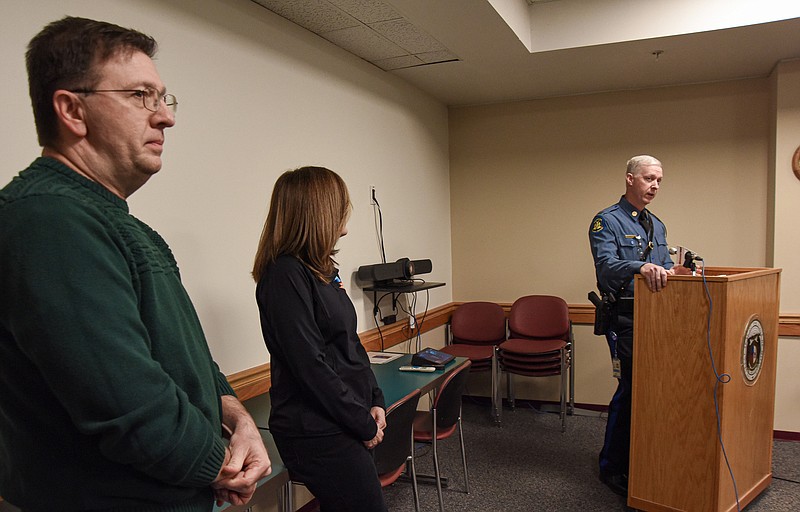State agencies are preparing for the first major storm of the winter.
A hazardous onslaught of snow, strong winds and frigid temperatures were slated to hit northwest Missouri on Wednesday night and move across the state throughout the day Thursday, according to the National Weather Service (NWS).
For the agencies tasked with clearing roads and managing the storm, concerns lie in bitter temperatures and dry snowfall, which could hinder cleanup efforts.
Jason Shafer, the department’s central district maintenance engineer, said, “We will be working throughout the course in the storm and we will not be ceasing operations until everything is cleaned up.”
In addition to several inches of snow, gusting winds will reach 40-45 miles per hour, creating blizzard-like conditions, NWS meteorologist Marshall Pfahler said. The NWS predicts the combination of frigid temperatures and strong winds could lead to dangerous wind chills between minus 20 and minus 30 degrees.
At a news conference Wednesday afternoon at the MoDOT Central District Office, Watkins, Shafer and other agency officials relayed their agencies’ strategies, concerns and recommendations for potential travelers during the winter storm.
Every speaker at the news conference recommended extreme caution and encouraged potential travelers to stay home if possible.
“Just because our trucks are out there doesn’t mean you’re immune to what’s going on,” Shafer said.
Crews were to start at 10 p.m. Wednesday and follow a strategy focusing on higher volume roads first, like Interstate 70 and Interstate 44 in central Missouri, then pivoting to lower-volume roads, he said. Workers will operate on 12-hour shifts.
But the department is short 1,000 workers, Shafer said.
“We know what the task is, and we’re going to stick to it until it’s accomplished. It’s just gonna take us longer,” he said.
Though Thursday will see the most snow, Friday and Saturday could still be hazardous due to the lingering impact of dry snow, which is powdery and has a lower moisture content, said Machelle Watkins, MoDOT Central district engineer.
“Each storm is kind of like a person,” Shafer said. “They may have some similar physical characteristics, but they’ve all got their own personality.”
He said a key characteristic of this storm will be the inundation of dry snow.
“Dry snow is not normal for what we see in Missouri, so it will present challenges that we don’t normally encounter,” he said.
It’s possible that snow drifts, banks of deep snow heaped up by the wind, will reach several feet deep, he said.
Hotz said more than 90 percent of the patrol’s vehicles are now four-wheel drive or all-wheel drive, which will help them navigate trickier areas.
Watkins noted many snowplow operators are newer employees. While they’ve been through training, this will be their first time operating a snowplow on their own.
“For people driving during the storm, please give those snowplow operators plenty of room to work,” she said. “Don’t crowd them. Don’t follow too closely. Don’t try to pass them. And don’t assume that because you can see them that they can see you. There are a lot of impediments to their vision.”
Alongside the challenges of dry snow, frigid temperatures will also be dangerous for people to be in for long periods of time. Hotz said the Highway Patrol will provide 24-hour coverage across the state to help with traffic crashes and exposure to the cold.
Temperatures well below zero rapidly thwart the effectiveness of the standard chemicals used for winter cleanups.
“Diesel fuel is prone to gelling at these lower temperatures, and all of our dump trucks are diesel powered,” Shafer said. “We’re not going to be able to have the same amount of effect for the same amount of material we normally do.
“We’re going to get to all of our roads, but it is going to be slow given the wind and the temperatures. This is going to be a very profound storm.”
The State Highway Patrol will be working with all local agencies, the State Emergency Management Agency (SEMA), the Department of Transportation and the National Guard, Hotz said.
For people who need to drive in these conditions, Holtz recommended assessing road conditions on MoDOT’s Traveler Information Map online or through the app. Road conditions and warnings are also posted on MoDOT’s Facebook and Twitter accounts, he said.
If traveling around this time is absolutely necessary, Hotz recommended a full tank of gas, blankets, gloves and provisions like water and snacks in the event of an emergency.
“You may think you’re going on a short trip and end up being out there for a long time,” Hotz said. “If you get stranded out there in these temperatures, it won’t take very long before you can really start experiencing some issues with the cold weather,” he said. “We’ve seen several instances over the last few years where a couple of tractor trailers can block the road for several hours.”
He said to ensure a vehicle is in good condition before taking it out.
“If you’ve got bald tires, now is not a time to be out riding on the road,” Hotz said.
In the event that a car slides off the road, Hotz said to stay inside the vehicle with a seatbelt strapped on. He said people are killed every year because they get out of the car after sliding off the roadway.
“Someone else comes along, loses control of their vehicle in that same area and frequently strikes the person out there on the side of the road,” Hotz said.
In the event of emergencies like these, he said to call *55 for the Highway Patrol or 911 for help.
Related on NewsTribune.com:
Jefferson City, organizations closing due to looming storm

